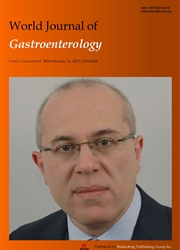

 中文摘要:
中文摘要:
AIM To evaluate the relationship between apurinicendonuclease 1 (APE1) Asp148Glu polymorphism andthe susceptibility to gastrointestinal (GI) cancers.METHODS: We searched PubMed, ISI Web of Knowledge,and Chinese National Knowledge Infrastructure (CNKI)databases updated on July 15, 2014 for relevant studies.Only case-control studies comparing APE1 Asp148Glupolymorphism and GI cancer risk were included. Weexcluded studies reporting only standardized incidenceratios without control groups and those without detailedgenotyping data. Meta-analysis was performed on17 studies involving 4856 cancer patients and 6136cancer-free controls. Review Manager version 5.1 wasused to perform the meta-analysis. The pooled oddsratios (ORs) and 95% confidence intervals (CIs) wereestimated under the allele contrast, homozygous,heterozygous, dominant and recessive genetic models.We also conducted subgroup analyses stratifiedby ethnicity and cancer type. Publication bias wasevaluated using Begg's test.RESULTS: The meta-analysis showed a significantassociation between APE1 Asp148Glu polymorphismand GI cancer risk in three genetic models in the overallpopulation (G vs T: OR = 1.18; 95%CI: 1.05-1.32; TGvs TT: OR = 1.28; 95%CI: 1.08-1.52; TG + GG vs TT:OR = 1.32; 95%CI: 1.10-1.57). Stratified analysis byethnicity revealed a statistically increased GI cancer riskin Asians (G vs T: OR = 1.27; 95%CI: 1.07-1.51; GG vsTT: OR = 1.58; 95%CI: 1.05-2.38; TG vs TT: OR = 1.30;95%CI, 1.01- 1.67; and TG + GG vs TT: OR = 1.38;95%CI: 1.07-1.78), but not in Caucasians. Further subgroup analysis by cancer type indicated that APE1Asp148Glu polymorphism may contribute to gastriccancer risk. However, Asp148Glu has no significantassociation with colorectal or esophageal cancer risk inany genetic model.CONCLUSION: This meta-analysis suggests that theAPE1 Asp148Glu polymorphism G allele is associatedwith an increased GI cancer risk, especially in gastriccancer.
 同期刊论文项目
同期刊论文项目
 同项目期刊论文
同项目期刊论文
 期刊信息
期刊信息
